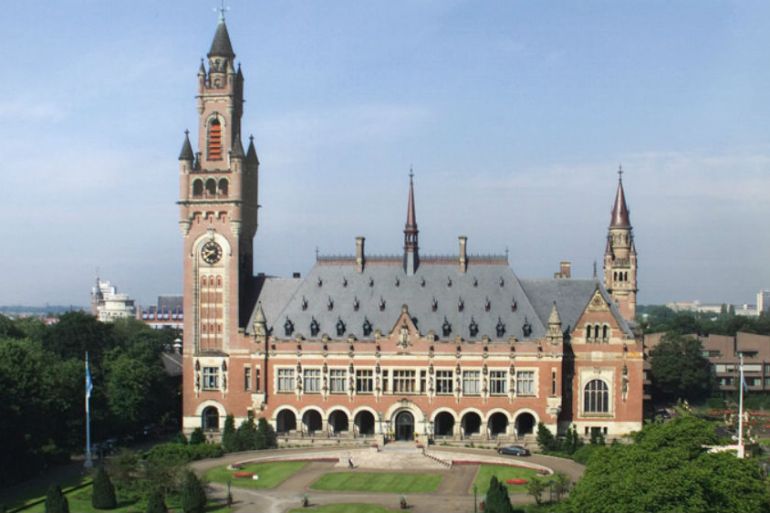‘Violence and hatred’: Qatar and UAE go head-to-head at The Hague
Three days of hearings at the International Court of Justice have centred around Doha’s blocking of a UAE visa website.

The United Arab Emirates (UAE) and Qatar traded accusations at the International Court of Justice on Thursday in the latest development in the ongoing Gulf diplomatic crisis.
In a July 2018 hearing, the ICJ ordered the UAE to ensure that Qatari families living in the Emirates are reunited with their relatives back home and Qatari students in the UAE are allowed to continue their studies without fear of deportation.
Keep reading
list of 4 itemsQatar emir condemns ‘genocide’ in Gaza, urges ceasefire at GCC summit
‘Enduring commitment’: Key takeaways from US-GCC joint statement
Analysis: Efforts to end Assad isolation gather speed after quake
But the UAE this week sought an injunction against Qatar, claiming Doha is blocking a website through which Qataris can apply for UAE visas.
Qatar told the court it had blocked the site, saying it posed a state security threat because of “malware” coded within that’s designed to infiltrate the Gulf state’s security systems.
“This is the world’s top court and both sides have employed some of the world’s best international lawyers,” said Al Jazeera’s Stefanie Dekker, reporting from The Hague.
|
|
“This is a legal issue so in one sense the politics have been left at the door. But really it’s all about the politics.”
‘Emergency’ injunction
The case revolves around the International Convention on the Elimination of All Forms of
Racial Discrimination.
Saudi Arabia, Egypt and Bahrain – the countries which, along with the UAE, have been enforcing a blockade of Qatar since June 2017 – have not signed up to the convention, and so the case is only between signatories Qatar and the UAE.
The wider ICJ discrimination hearing between the UAE and Qatar, stemming from the ongoing blockade, has not yet been ruled upon – but experts say this week’s “emergency” injunction has been sought by UAE officials fearful that Qatar may be undermining its case.
“Qatar has come to this court, they have also come to the Committee for the Elimination of Racial Discrimination, and they’ve also gone to several other places to try to resolve this,” William Worster, adjunct professor of law at The Hague University, told Al Jazeera.
|
|
“They have a large political disagreement, yes – [but] there are legal elements within that – so with violations of international treaties etc, where they do have legal claims, they have taken these legal issues to this legal forum. The political issues will remain in the political forum.”
‘Campaign of hatred’
The UAE claimed on Thursday that Qatar’s accusations against it were false and alleged Doha had forged evidence. It has also said Qatar’s blocking of the visa website was a deliberate attempt to impair the UAE’s efforts to implement the court’s order.
Qatar, however, said the UAE was carrying out “a campaign of violence and hatred” against its citizens and urged the UN’s top court to throw out Abu Dhabi’s case.
“It is the Qatari people who are the true victims in the racial discrimination case, not the government of the UAE,” said Qatar’s representative Mohammed Abdulaziz al-Khulaifi.
Neither side has made any official comment to reporters. The three days of hearings concluded on Thursday, and a verdict is expected in the coming days.